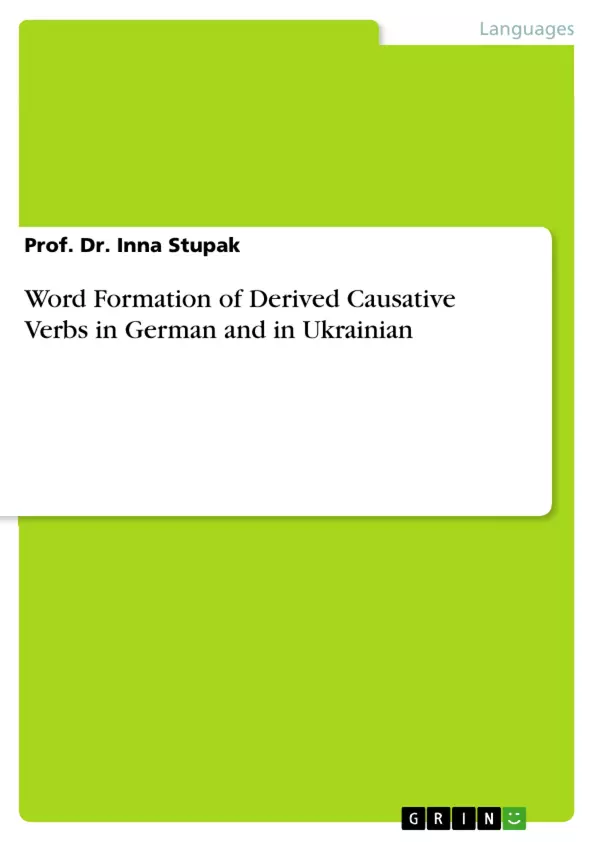The functional-semantic category of causativity can be expressed on different levels of the language system. However, one of the main lexical means of expressing causativity is considered to be causative verbs, the definitions of which are in part contradictory.
Generally, linguists single out causative verbs as being those transitive verbs with the meaning of ‘changing a state’ or ‘causing an action’, which is expressed by a corresponding verbal stem. Taking this definition of causative verbs into account, in the article we refer to this group, verbs which cause a different action or state in, at least, two situations connected by causation relations and reflect cause-and-effect relations on a referential level.
The object of this research is thus DCV (derived causative verbs) – verbs united by the general meaning of causativity, formed (in the paper, the terms “formed” and “motivated” are used synonymously) from motivated stems of different parts of speech with the aid of word forming means inherent to verb formation, i.e. units creating word forming category of causativity.
The main empirical material is obtained by means of continuous sampling of DCV from definition dictionaries of the German and the Ukrainian languages.
The results obtained from dictionary and text sampling were used to establish the productivity degree of certain DCV formation means and ways, semantic types in both languages, productivity correlation of DCV semantic types and their frequency.
Table of Contents
- Word Formation of Derived Causative Verbs in German and Ukrainian Languages
- Different Approaches to Defining Causative Verbs
- Three Criteria for Defining Causative Verbs
- Definition of Causative Verbs in This Research
- Types of Correlation of Causative/Non-Causative Meanings
- The Object of Research: Derived Causative Verbs (DCV)
- Empirical Material and Methodology
- Analysis of the Corpus of DCV
- Aspect Pairs and Word Formation
Objectives and Key Themes
This research aims to investigate the formation of derived causative verbs (DCV) in German and Ukrainian languages. The study focuses on the lexical-semantic features of these verbs, their structural types, and the process of their formation through various word-forming means.
- The definition and classification of causative verbs
- The formation and structure of derived causative verbs
- The role of motivated stems in the formation of derived causative verbs
- The productivity and frequency of derived causative verbs in German and Ukrainian
- The relationship between aspect pairs and word formation in derived causative verbs
Chapter Summaries
- This chapter provides a comprehensive overview of the research, outlining the main objectives and goals. It introduces the concept of causativity and the different approaches to defining causative verbs in linguistics. The chapter concludes with a clear definition of causative verbs as used in this research.
- This chapter delves into the different types of correlations between causative and non-causative meanings, providing examples from both German and Ukrainian. It examines various approaches to defining causative verbs, including those based on semantics, transitivity, and the existence of a non-causative correlate.
- This chapter focuses on the specific object of research: derived causative verbs (DCV). It defines DCV as verbs united by the general meaning of causativity, formed from motivated stems of different parts of speech. The chapter also discusses the empirical material and methodology used in the research, including dictionary and text sampling.
- This chapter presents the analysis of the corpus of DCV collected from dictionaries and texts. It examines the structural types of DCV, their formation ways, and their productivity in both German and Ukrainian. The chapter also investigates the role of categorical meaning of motivated stems in DCV formation.
- This chapter explores the relationship between aspect pairs and word formation in DCV. It examines the concept of aspect pairs and how they differ from word formation, emphasizing the importance of distinguishing between form formation and word formation in the study of DCV. The chapter concludes with examples demonstrating how word formation can simultaneously change both aspect and lexical meaning in DCV.
Keywords
Causative verbs, derived causative verbs, word formation, German language, Ukrainian language, semantics, transitivity, motivated stem, aspect pairs, dictionary sampling, text sampling, productivity, frequency.
Frequently Asked Questions
What are derived causative verbs (DCV)?
DCVs are transitive verbs that express the meaning of 'causing an action' or 'changing a state,' formed from motivated stems of different parts of speech using specific word-forming means.
How does the research compare German and Ukrainian DCVs?
The study analyzes the productivity of formation means, semantic types, and the frequency of these verbs in both languages using dictionary and text sampling.
What criteria define a causative verb in this study?
The research uses three criteria: semantics (cause-and-effect relations), transitivity, and the existence of situations connected by causation.
What is the role of aspect pairs in Ukrainian DCVs?
The study emphasizes the distinction between word formation and form formation (aspect), showing how word formation in Ukrainian can change both lexical meaning and aspect simultaneously.
What methodology was used for the empirical analysis?
The research utilized continuous sampling of derived causative verbs from definition dictionaries and corpora of both the German and Ukrainian languages.
- Citar trabajo
- Prof. Dr. Inna Stupak (Autor), 2016, Word Formation of Derived Causative Verbs in German and in Ukrainian, Múnich, GRIN Verlag, https://www.grin.com/document/347114



